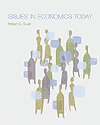| base year | Year in which the market basket is established and year to which all other prices are compared.
|
 |
 |
 |
| business cycle | Regular patter of ups and downs in the economy
|
 |
 |
 |
| Consumer Price Index (CPI) | The price index based on what average consumers buy.
|
 |
 |
 |
| cost of living adjustment (COLA) | A device that compensates people for the fact that changes in inflation change the spending power of their income.
|
 |
 |
 |
| cyclical unemployment | State that exists when people lose their jobs because of a temporary downturn in the economy.
|
 |
 |
 |
| depression | Severe recession typically resulting in a financial panic and bank closures, unemployment rates exceeding 20 percent, prolonged retrenchment in RGDP on the magnitude of 10 percent or more, and significant deflation.
|
 |
 |
 |
| discouraged-worker effect | Bad news induced people to stop looking for work, causing the unemployment rate to fall.
|
 |
 |
 |
| encouraged-worker effect | Good news induces people to start looking for work, causing the unemployment rate to rise (until they succeed in finding work).
|
 |
 |
 |
| expansion | The part of the growth period of the new business cycle from the previous peak to the new peak.
|
 |
 |
 |
| frictional unemployment | Short-term unemployment during a transition to an equal or better job.
|
 |
 |
 |
| GDP deflator (GDPDEF) | The price index used to adjust GDP for inflation, including all goods rather than a market basket.
|
 |
 |
 |
| gross domestic product (GDP) | The dollar value of all of the goods and services produced for final sale in the United States in a year.
|
 |
 |
 |
| inflation rate | The percentage increase in the consumer price index.
|
 |
 |
 |
| macroeconomics | That part of the discipline of economics that deals with the economy as a whole.
|
 |
 |
 |
| market basket | Those goods that average people buy and the quantities they buy them in.
|
 |
 |
 |
| microeconomics | That part of the discipline of economics that deals with individual markets and firms.
|
 |
 |
 |
| peak | The highest point in the business cycle.
|
 |
 |
 |
| price index | A device that centers the price of the market basket around 100.
|
 |
 |
 |
| price of the market basket in the base year | National average of the total cost of the market basket for the first month in the fiscal year.
|
 |
 |
 |
| real gross domestic product (RGDP) | An inflation-adjusted measure of GDP.
|
 |
 |
 |
| recession | The declining period of at least two consecutive quarters in the business cycle.
|
 |
 |
 |
| recovery | The part of the growth period of the business cycle from the trough to the previous peak.
|
 |
 |
 |
| seasonal unemployment | A subset of cyclical unemployment that exists when people lose their jobs predictably every year at the same time.
|
 |
 |
 |
| structural unemployment | State that exists when people lose their jobs because of a change in the economy that makes their particular skill obsolete.
|
 |
 |
 |
| trough | The lowest point in the business cycle.
|
 |
 |
 |
| underemployment | The state of working significantly below skill level or working fewer hours than desired.
|
 |
 |
 |
| unemployment rate | The percentage of people in the work force who do not have jobs and are actively seeking them.
|
 |
 |
 |
| work force | All those nonmilitary personnel who are over 16 and are employed or are unemployed and actively seeking employment.
|




 2003 McGraw-Hill Higher Education
2003 McGraw-Hill Higher Education


 2003 McGraw-Hill Higher Education
2003 McGraw-Hill Higher Education